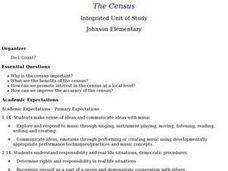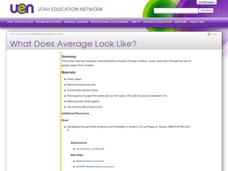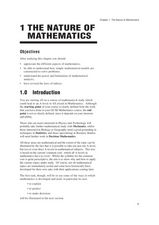Curated OER
Math Averages
Students perform different activities to better explain that the word "Average" has 5 different meanings.
Curated OER
Graphing
Students collect data to create different types of graphs-line, pie, and bar graphs. They use StarOffice 6.0 to create graphs.
Curated OER
Leonardo da Vinci
Middle schoolers select appropriate tools and technology to perform tests, collect data, and display data. They construct appropriate graphs from data and develop qualitative statements about the relationships between variables.
Curated OER
Mean, Median, and Mode
Seventh graders examine the uses of mean, median, and mode. They define key vocabulary terms, observe the teacher model examples of mean, median, and mode, and discuss real world examples of central tendency of sets of data. Students...
Curated OER
The Census
Students analyze why the census is important and the benefits of it. Determine rights and responsibilities in real life situations. They are divided into groups and take a mock census of a list of teachers and students each. Results of...
Curated OER
Yeast: A Dihybrid Cross
Students create a yeast dihybrid cross and follow two forms of each of two traits: red growth versus cream color, and tryptophan-dependent versus tryptophan-independent. They complete diagrams to represent the alleles, predict the...
Center of Excellence for Science and Mathematics Education
A Sick Astronaut
Aspiring astronauts graph, interpret, and analyze data. They investigate the relationship between two variables in a problem situation. Using both graphic and symbolic representations they will grasp the concept of line of best fit to...
Curated OER
Lego Robotics: Measuring Speed
Students build and program a LEGO robotic car as well as measure and graph its speed. They acquire familiarity with principles of construction, motion, design and problem solving. They compare a robot's speed over two different surfaces...
Curated OER
Designing Samples/Simple Random Samples
Students consider the advantages and disadvantages of various sampling techniques. They define a simple random sample and identify possible sources of bias in other types of samples. Answer Key included.
Curated OER
What Does Average Look Like?
Fifth graders explore the concepts of range, median, mode, and mean through the use of graphs drawn from models. They use manipulatives to represent data they have collected within their groups, and compare the differences between mode,...
Curated OER
Health Education: Tobacco
Third graders analyze the dangers of using tobacco products. In this personal health lesson plan, 3rd graders predict and summarize the dangers of experimenting with tobacco.
Curated OER
The Nature of Mathematics
In this nature of mathematics worksheet, students identify the different aspects of mathematics and how simple mathematical models are constructed to solve problems. Then, they define the power and limitations of mathematical analysis....
Curated OER
Hypothesis Testing: Two Sample Tests
Students experiment and compare results of two populations. In this men and women populations lesson, students examine the difference in hand span for men and women. Students calculate a norm based on their results. Students complete...
Curated OER
The Appearance of a Graph
Sixth graders understand that the appearance and increment used on the x and y axis in a graph change how it looks. In this graphing lesson, 6th graders work in pairs and interpret graphs using different axes. Students collect graphs...
Curated OER
Time Management: Piece of Pie
Middle schoolers examine their own lives and how well they manage their time outside of school. In this this time management instructional activity, students discover the amount of time they spend on other activities, and create a pie...
Curated OER
Recognize, create and Record Simple Repeating Patterns
Students analyze, create, and record repeating patterns. In this geometry lesson, students create shapes using patterns and keep track of the different shapes. They incorporate transformation and reflections into their patterns.
Curated OER
The Yo-Yo Problem: Solving Linear Equations
Students compute the length of time it will take to save enough money to purchase a yo-yo. In this math instructional activity, students create a design with pennies and write the associated linear equation. In this linear equations...
Curated OER
Patterns Here, There, and Everywhere!
Upper graders access the Microsoft Word program and create patterns by utilizing certain keys on the keyboard. They create picket fences, smiley faces, and hearts. It seems that this lesson has as much to do with keyboarding skills as it...
Curated OER
Water Resources
Learners explore the differences between surface water and ground water. They collect data using maps and graphs and investigate a Texas river basin and a nearby aquifer. They complete a written report of their findings regarding the...
Curated OER
Visual Representation of Reduced Fat
Students demonstrate their understanding of the Five-Number Summary and Box-Plots by analyzing different nutrition labels from regular and reduced fat items using graphing calculators.
Curated OER
Stats on Reduced-Fat
Students demonstrate an understanding of the Five-Number Summary and Box-Plots after analyzing data from nutrition labels, forming a hypothesis and supporting it. They decide if there is a significant difference between reduced fat and...
Curated OER
Art Nouveau
Students study the design elements of Art Nouveau, its sources and development. They create art projects in ceramics and glass that exemplify the focus of Art Nouveau as a decorative style.
Curated OER
Richard's Dice
Students problem solve logic problems. They complete a worksheet using dice as a manipulative. They decide on a problem solving strategy, solve the problem, and write up the solution.
Curated OER
Rolling Records
Fourth graders play a game to determine the likelihoods of different outcomes when rolling two number cubes. Students play a game to determine the likelihoods of different outcomes when rolling two number cubes.

























